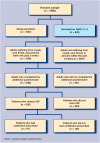Illness behaviour and antibiotic prescription in patients with respiratory tract symptoms
- PMID: 17727749
- PMCID: PMC2099639
Illness behaviour and antibiotic prescription in patients with respiratory tract symptoms
Abstract
Background: Although the vast majority of respiratory tract symptoms are self-limiting, many patients visit their GP for these symptoms and antibiotics are over-prescribed.
Aim: To explore determinants of patients visiting GPs for recent cough, sore throat, or earache; for being prescribed antibiotics; and for patients' satisfaction with visiting the GP.
Design of the study: Second Dutch National Survey of General Practice (DNSGP-2) with a health interview and an additional questionnaire.
Setting: A total of 7057 adult patients of 163 GPs in the Netherlands.
Method: Characteristics of patients and GPs as well as morbidity data were derived from the DNSGP-2 and a health interview. Characteristics of the symptoms, GPs' management and patients' satisfaction were measured by an additional written questionnaire. Data were analysed by means of multivariate logistic regression.
Results: About 40% of the responders (n = 1083) reported cough, sore throat, or earache in the 2 weeks preceding the interview and, of them, 250 visited their GP. Of this latter group, 97 patients were prescribed antibiotics. Apart from non-medical reasons, relevant medical factors played an important role in deciding to visit the GP. Smokers and patients with cardiac disease or diabetes mellitus were not especially inclined to see their GP. Smoking behaviour, fever, and views on respiratory tract symptoms and antibiotics of patients and GPs were associated with being prescribed antibiotics. Patients' perception of having been carefully examined was associated with their satisfaction, while receiving antibiotics was not.
Conclusion: GPs should inform patients with clear elevated risk when to visit their GP in cases of cough, sore throat, or earache. There is still a need for GPs and patients to be better informed about the limited significance of single inflammation signs (for example, fever and green phlegm) as an indication for antibiotics. Careful examination of the patient contributes to patient satisfaction.
Figures
Similar articles
-
Characteristics of children consulting for cough, sore throat, or earache.Br J Gen Pract. 2008 Apr;58(549):248-54. doi: 10.3399/bjgp08X279751. Br J Gen Pract. 2008. PMID: 18387228 Free PMC article.
-
Views on respiratory tract symptoms and antibiotics of Dutch general practitioners, practice staff and patients.Patient Educ Couns. 2006 Jun;61(3):342-7. doi: 10.1016/j.pec.2005.03.012. Epub 2005 Apr 21. Patient Educ Couns. 2006. PMID: 16731314
-
The influence of gender concordance between general practitioner and patient on antibiotic prescribing for sore throat symptoms: a retrospective study.BMC Fam Pract. 2018 Nov 17;19(1):175. doi: 10.1186/s12875-018-0859-6. BMC Fam Pract. 2018. PMID: 30447685 Free PMC article.
-
Expectations for consultations and antibiotics for respiratory tract infection in primary care: the RTI clinical iceberg.Br J Gen Pract. 2013 Jul;63(612):e429-36. doi: 10.3399/bjgp13X669149. Br J Gen Pract. 2013. PMID: 23834879 Free PMC article. Review.
-
[Revision of the Dutch College of General Practitioners practice guideline 'Acute sore throat'].Ned Tijdschr Geneeskd. 2015;159:A9456. Ned Tijdschr Geneeskd. 2015. PMID: 26332822 Review. Dutch.
Cited by
-
Antibiotic prescribing and patient satisfaction in primary care in England: cross-sectional analysis of national patient survey data and prescribing data.Br J Gen Pract. 2016 Jan;66(642):e40-6. doi: 10.3399/bjgp15X688105. Epub 2015 Dec 6. Br J Gen Pract. 2016. PMID: 26639947 Free PMC article.
-
Converting habits of antibiotic prescribing for respiratory tract infections in German primary care--the cluster-randomized controlled CHANGE-2 trial.BMC Fam Pract. 2012 Dec 20;13:124. doi: 10.1186/1471-2296-13-124. BMC Fam Pract. 2012. PMID: 23256712 Free PMC article. Clinical Trial.
-
Characteristics of children consulting for cough, sore throat, or earache.Br J Gen Pract. 2008 Apr;58(549):248-54. doi: 10.3399/bjgp08X279751. Br J Gen Pract. 2008. PMID: 18387228 Free PMC article.
-
Efficacy and Safety of Oral Spray Containing Lysozyme and Cetylpyridinium: Subjective Determination of Patients with Tonsillopharyngitis.Mater Sociomed. 2016 Dec;28(6):459-463. doi: 10.5455/msm.2016.28.459-463. Mater Sociomed. 2016. PMID: 28144200 Free PMC article.
-
Barriers and facilitators to prudent antibiotic prescribing for acute respiratory tract infections: A qualitative study with general practitioners in Malta.PLoS One. 2021 Feb 11;16(2):e0246782. doi: 10.1371/journal.pone.0246782. eCollection 2021. PLoS One. 2021. PMID: 33571265 Free PMC article.
References
-
- Van der Linden MW, Westert GP, de Bakker DH, Schellevis FG. Tweede nationale studie naar ziekten en verrichtingen in de huisartsenpraktijk: klachten en aandoeningen in de bevolking en in de huisartspraktijk. Utrecht/Bilthoven: NIVEL/RIVM; 2004. [Second Dutch national survey on morbidity and interventions in general practice: complaints and diseases in the population and in general practice; in Dutch]
-
- Last JM. The iceberg: completing the clinical picture in general practice. Lancet. 1963;ii:28–31. - PubMed
-
- Arroll B. Antibiotics for upper respiratory tract infections: an overview of Cochrane reviews. Respir Med. 2005;99(3):255–261. - PubMed
-
- Smucny J, Fahey T, Becker L, Glazier R. Antibiotics for acute bronchitis. Cochrane Database Syst Rev. 2004;(4) CD000245. - PubMed
Publication types
MeSH terms
Substances
LinkOut - more resources
Full Text Sources
Medical
Research Materials

